Southern Water has become the latest water firm to bring in a hosepipe ban as England continues to struggle with the driest start to the year since 1976.
Restrictions on hosepipes for watering gardens, filling paddling pools or washing cars will begin for one million households in Hampshire and the Isle of Wight from Monday.
The move aims to protect the ‘critically low’ Test and Itchen chalk streams, which supply most of the area’s water, but levels are down 24 per cent on normal flows for the time of year, Southern Water said.
It is the latest announcement by water companies bringing in hosepipe bans after the driest start to the year since 1976 for England – and it comes as TikTokers claim they are flouting the hosepipe ban as they continue to fill up pools.
Homeowners are posting jovial videos showing them using the hose in their gardens – with one saying: ‘I pay my water bill so I will be filling up the pool for the kids.’
Another posted a clip of a happy girl enjoying the pool on a sunny day, writing: ‘Hosepipe ban? Someone come tell her that she can’t do this today.’
A third uploaded a clip showing them with a hosepipe next to their pool in the garden, writing: ‘Do you think I’m playing in doors when it’s 30C out here?’
And one showed a hosepipe running into a garden being used to fill up a pool under the caption ‘breaking the law’, adding: ‘It’s not me, it’s the neighbours hahahaha.’
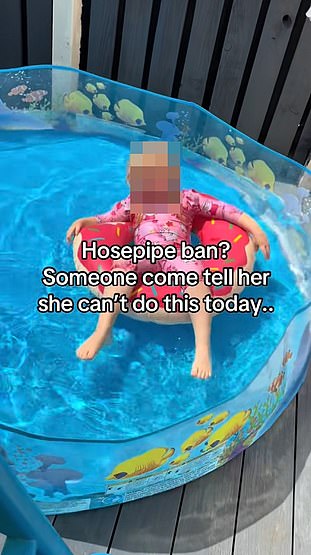
TikTok users claim they are flouting a hosepipe ban as they continue to fill up pools – although one (bottom right) has insisted the video was a joke, and she is not in an area with restrictions
Others said they were filling up pools before the ban in their area came in, so they could enjoy being in the water outside even once the restrictions had begun.
Some came up with workarounds, such as filling up the pool with a kettle – or running the water from an outside tap through a water bottle with a hole in the bottom.
And gardening experts also pointed out that those in hosepipe ban areas are still allowed to water their plants by filling up a watering can from an outdoor tap.
Rainfall across England was 20 per cent less than the long-term average for June, which was also the hottest on record for the country, with two heatwaves driving unusually high demand for water, the Environment Agency has said.
More heatwave conditions have followed in July, with the Met Office warning weather extremes such as heat have become the ‘norm’ for the UK as a result of climate change driven by human activities such as burning fossil fuels.
East and West Midlands became the latest areas of England to fall into drought amid three summer heatwaves so far and a drier than average June.
The Environment Agency said three more areas – Lincolnshire and Northamptonshire, East Anglia, and Thames area – have now moved into prolonged dry weather status.
The East and West Midlands regions have joined Yorkshire, Cumbria and Lancashire, and Greater Manchester, Merseyside and Cheshire, which are already in drought.
Across England, rainfall was 20 per cent less than the long-term average for June, which was also the hottest on record for the country with two heatwaves driving unusually high demand for water, the Environment Agency said.
Reservoir levels continue to fall, with storage across the country at 76 per cent.
Other TikTok users have been filling up pools before the hosepipe ban in their area came in
Millions of households are facing water restrictions, with a hosepipe ban implemented in Yorkshire last Friday in the face of reservoir storage at only 54 per cent.
Yorkshire Water said restrictions on using hosepipes for activities such as watering the garden, cleaning cars and filling paddling pools were brought in to try to protect supplies in the face of more dry weather forecast in the coming weeks.
Customers who ignore the hosepipe ban could face fines of up to £1,000, but the utility said ‘we hope it won’t come to that’ as it urged households to help conserve water by sticking to the restrictions.
The restrictions include using a hosepipe to water gardens and wash private vehicles, fill domestic pools or clean outdoor surfaces.
People can still wash their car and water their gardens using tap water from a bucket or watering can, while the region’s 139,000 businesses will be allowed to use a hosepipe if it is directly related to an essential commercial purpose – but not for other uses such as cleaning paths outside a business property.
Youlgrave Waterworks, a private firm which supplies 500 homes in Derbyshire, became the first to introduce a hosepipe ban at the start of last month.
But Yorkshire Water was the first major utility to bring in restrictions for its 5.7million customers.
Embattled utility Thames Water has also announced a ban which will begin next Tuesday for customers in Oxfordshire, Gloucestershire, most of Wiltshire and some parts of Berkshire.
London has avoided the ban, which will be applied to 1.1million customers in postcodes beginning with OX, GL, SN, RG4, RG8 and RG9.
The water company has asked customers not to use hosepipes, including for cleaning cars, watering plants, filling pools or cleaning windows.
Businesses which use water as a core part of their purpose, such as garden centres and car washes, will be exempt.
South East Water has a ban in place from this Friday, which will affect homes and businesses in Ashford, Canterbury, Eastbourne, Maidstone, Haywards Heath and Royal Tunbridge Wells.
Southern Water’s water managing director Tim McMahon said: ‘We’re sorry we’re taking this step, but as other water companies have already done, we have to respond to the widespread and prolonged dry weather affecting our region.
‘In our case, this means a hosepipe ban for our customers in Hampshire and the Isle of Wight to protect the health of our amazing chalk streams, which as one of the rarest habitats on earth has been compared to the Amazon Rainforest.
Some people have come up with workarounds, such as filling up the pool with a kettle (right)- or running the water from an outside tap through a water bottle with a hole in the bottom (left)
While some appeared to be confused as to what the ban means (left), gardening experts say those in hosepipe ban areas can still water their plants by filling up a watering can (right)
‘We must act now to support the wildlife that live there, including Atlantic salmon and southern damselfly.’
He said the company has been working ’24/7′ to find and fix leaks, and ensuring the network is working as efficiently as possible, but it is ‘not enough’, and he urged customers to help to reduce use by adhering to the ban.
Meanwhile Anglian Water, which supplies drinking water to 4.3 million customers across the East of England – the driest part of the country – said recent rain has prevented the need for a hosepipe ban, but one could still be required this summer.
Recent rain has helped river and reservoir levels and more is predicted for the coming weeks, but with an ‘exceptionally dry’ few months and uncertainty over the forecast, a hosepipe ban may yet be needed, the utility said.
The warning comes after East Anglia was among the regions moved into prolonged dry weather status, at the same time drought was declared in the East and West Midlands.
Anglian Water’s director of water services, Ian Rule, said: ‘The East of England is the driest part of the country so we’re used to seeing a lack of rainfall in our region and we plan accordingly.
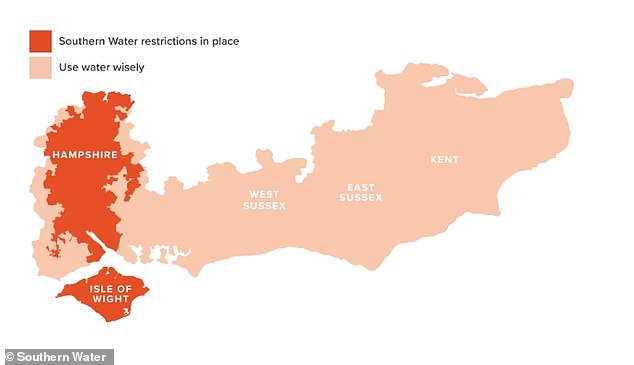
Southern Water has revealed a hosepipe ban for Hampshire and the Isle of Wight from Monday
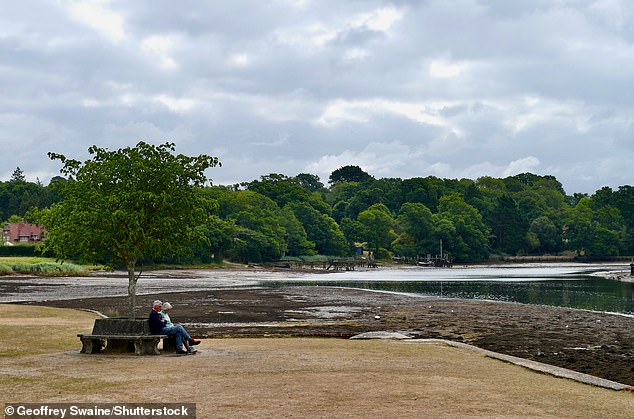
People sit on a bench on dry grass at Beaulieu in the New Forest in Hampshire on Monday
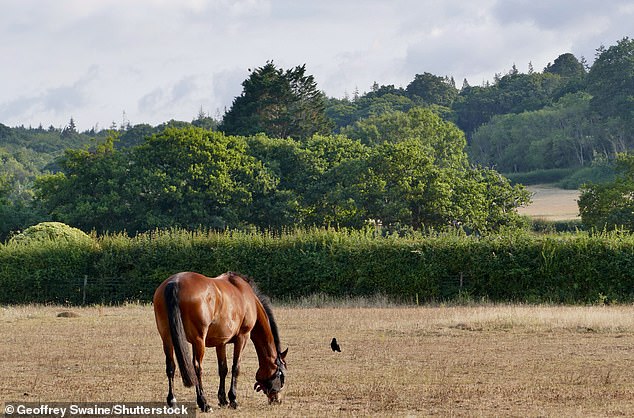
A horse grazes on dry grass by the Beaulieu River, Hampshire, in the sunshine on Monday
‘Our focus on leakage, and the investment we’ve put in place to give us resilience in the face of climate change, has helped to delay the need for restrictions, but the last few months have been exceptionally dry, even by our standards.
‘River levels had been looking very low following the historically dry spring, but they have responded better than expected to recent rainfall.
‘There is also some rain in the forecast over the coming weeks which, if it materialises, could provide some welcome respite for the region’s rivers and reservoirs.
‘However, the forecast is far from certain, so we’re closely monitoring the situation and if the exceptionally dry weather does continue, then restrictions might still be needed this summer.’
He also said the dry ground means water pipes are at greater risk of shifting and breaking, and the company is facing an increase in issues being reported, with teams working round the clock to fix burst and leaking pipes.
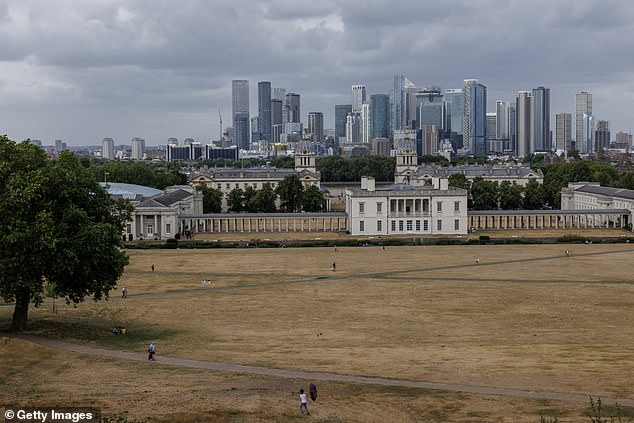
People walk over dried grass at Greenwich Park in South East London yesterday
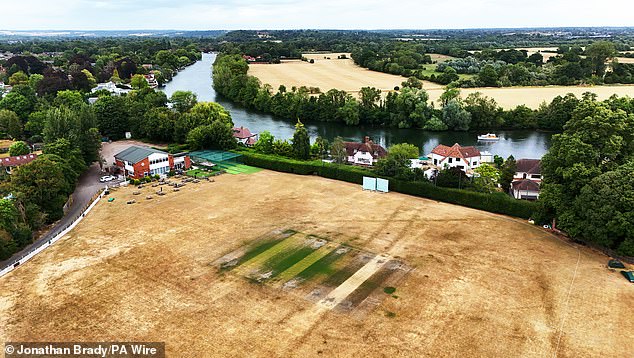
Dried grounds surrounds pitches at Maidenhead and Bray Cricket Club in Berkshire yesterday
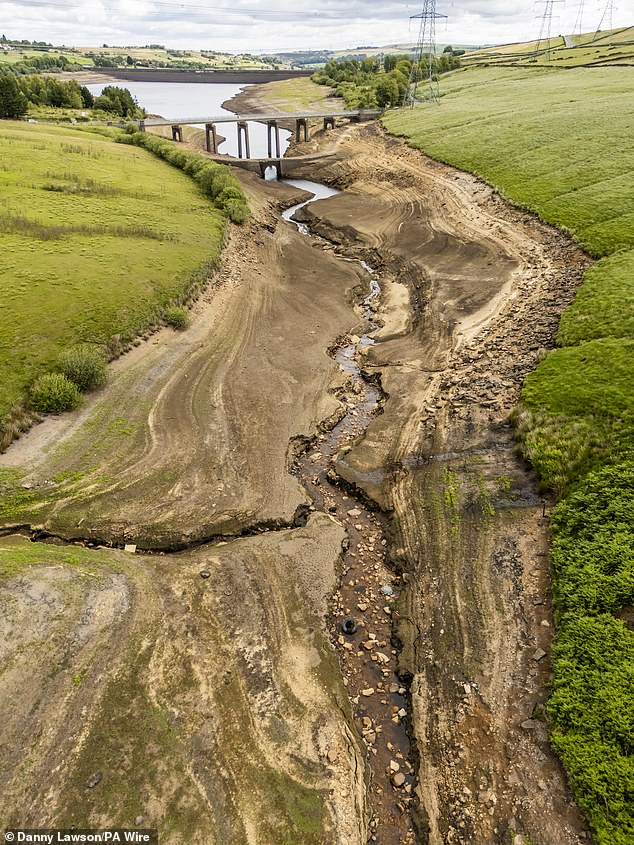
Dry cracked earth at Baitings Reservoir in Ripponden, West Yorkshire, last Wednesday
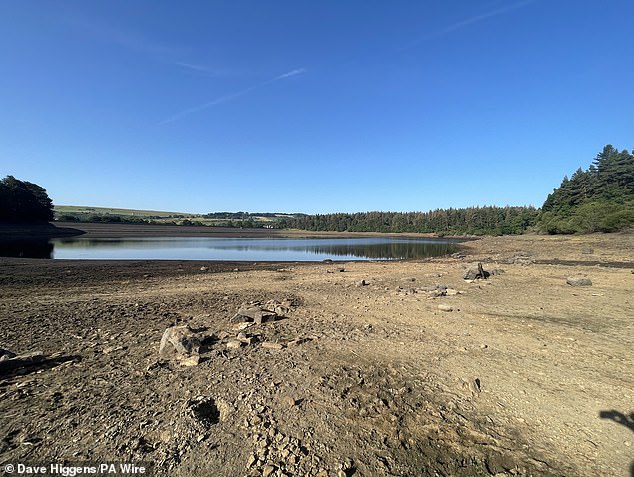
Low water levels at Yorkshire Water’s Agden Reservoir near Sheffield last Saturday
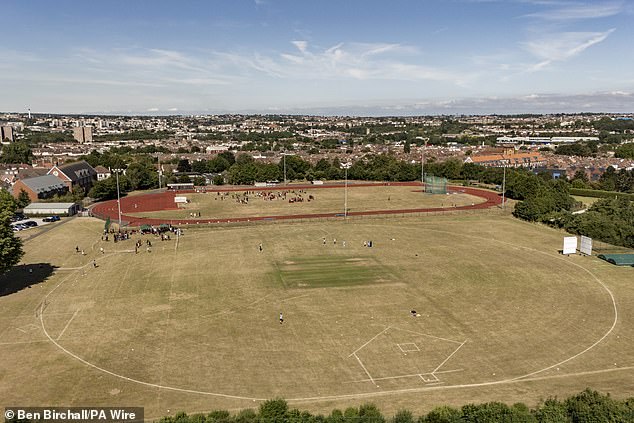
Wilting cricket creases are surrounded by parched grass at a sports ground in Bristol last week
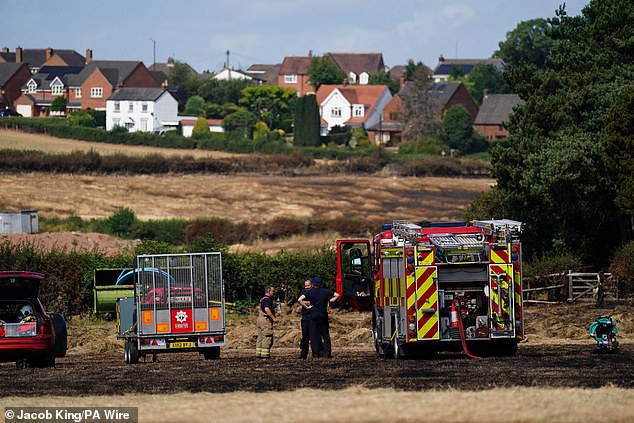
Firefighters at a field in Marlbrook, Worcestershire, following a wildfire on Saturday evening
The company does not want to put restrictions in place unnecessarily, he added, but protecting the environment and the region’s ‘vital’ agricultural sector means leaving as much water in the environment as possible.
The Environment Agency has warned that without substantial rain, more bans will follow.
The drought declaration for the Midlands, where some river flows are at their lowest for June since 1976, came after the latest meeting of the National Drought Group – with the situation deteriorating since the group last met in early June.
Water companies are being told to follow their drought management plans as well as step up work to fix leaks.
The public are being urged to use water wisely across England and comply with any local restrictions as the dry weather continues to impact water resources nationwide.
Anglers, wild swimmers and boaters are also being urged to report any environmental issues they see, such as fish in distress in low water conditions.












